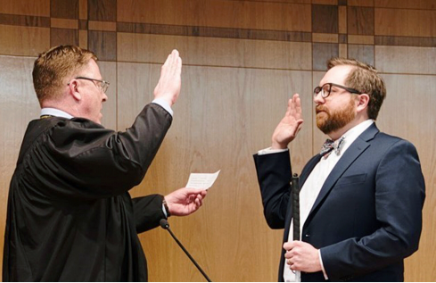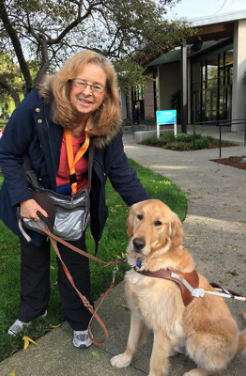Landing the job with vision loss
February 18, 2021
Job hunting when you live with vision loss can pose unique challenges. We’ve gathered expert advice to empower your job search from interview to offer.

Attorney David Freeman’s swearing in as a newly appointed Washington State Superior Court Judge, wearing his signature bow tie.
When David Freeman was young he had big plans. Inspired by his father, who built a career as an administrative review judge before becoming severely disabled when Freeman was 8, he dreamed of studying law himself. “The thought of following in my dad’s footsteps, even though I never really got to see him practice, was a motivator for me as a young kid,” Freeman said.
When Freeman was 14, however, everything changed. That’s when he and his mom were diagnosed with retinitis pigmentosa (RP). Suddenly, his future became unknown and a career in law seemed out of the question. At the time, he’d never met or heard of a blind lawyer before and so couldn’t imagine that path for himself.
Finding a job or landing a promotion can be challenging for anyone. Looking for work when you have vision loss, however, can feel daunting. For example, you might be wondering:
- Will declining vision affect your career potential?
- What kinds of jobs will you be able to do?
- Will employers have misconceptions about your capabilities?
- And just how upfront should you be about your vision loss when interviewing for a job?
We’ve collected insights and advice from experts with firsthand experience, including Freeman, who today serves as a judge for the Washington State Superior Court.
Job hunting with vision loss
As someone living with vision loss, Lynne Maleeff knows how hard it can be to find work. The Pennsylvania woman, diagnosed with RP when she was 31, has had to reinvent her career several times over the years as her vision declined. Maleeff knows how to search for and land a job. As a former employment counselor for the Montgomery County Association for the Blind, she spent nearly nine years advising clients who were looking for work.

Lynne and her guide dog, Kenny, smile at the camera.
“First of all, I would talk to them about confidence,” said Maleeff. “You have to find the parts of yourself that you can talk about, that you feel strongly about. Then, lead with your best foot forward. Let them know your skills and how you operate.” She points out that a person with progressive vision loss has to recreate themselves constantly, which makes them a strong problem solver.
Maleeff advises patience during the job-search process. Finding the right fit can take time when you have vision loss, and employment numbers in the vision loss community certainly seem to underscore that point. According to the U.S. Census Bureau only 44 percent of people with vision loss are employed, compared with 79 percent of those without disabilities. Understanding the reality of the challenge can help job seekers maintain both hope and persistence.
Undergoing skills training from a vocational rehabilitation (VR) services program is another important step for job seekers with vision loss. These programs often offer vision rehabilitation therapists, orientation and mobility instructors, and assistive technology specialists who provide training in areas that will strengthen your candidacy by helping you develop marketable skills.
The effect of mentors
As a teen, Freeman’s RP diagnosis made his dream of pursuing law seem out of reach and he fell into a depression. That’s when his mom knew she needed to take action. She reached out to a former colleague of her husband’s, a lawyer who was an administrative law judge with the federal government. She asked the judge to meet with her 17-year-old. That perfectly timed appearance of a mentor made all the difference.
Mentors might be a family friend or someone you meet by networking through what employment advisors call “the informational interview.” Maleeff believes that informational interviews can be key in landing a job. “Don’t be afraid to ask someone for an informational interview,” she said. “When you find someone to interview, just say: ‘I’m not sure if this is a position that I might want. Can I have 15 minutes of your time to see if this is a position I should pursue?’” Maleeff says that, often, those 15 minutes will turn into an hour, and with a little luck, an introduction to someone looking to hire. In Freeman’s case, meeting a mentor woke him to a possibility that had been there all along.
“My father’s colleague was fully blind, and it was kind of a wake-up call to me,” Freeman said. “He was an example of somebody who was blind and excelling in the law. It made me feel like, although my situation might be a challenge, it’s not a tragedy. It was something I could overcome.” Overcome, he did. Freeman, now a Superior Court Judge in Washington state, won re-election to the seat in 2020.
The interview
Once you’ve applied for a position and been invited to interview, the question of disclosure takes center stage. If you haven’t yet told a potential employer about your inherited retinal disease (IRD) and vision loss, you’ll want to decide if, when, and how that conversation should unfold. While people living with blindness and vision loss are protected under the Americans with Disabilities Act (ADA), ultimately disclosure can be a personal decision. Here are some questions to ask yourself as you assess your own situation:
- How significant is my vision loss right now?
- Once the loss progresses, how will it affect my job?
- What strategies and technologies will help me do my job at an optimal level?
- Will I need accessibility provisions at work?
Freeman was very transparent about his vision loss early in his career. “There were some interviews right out of law school that I had thought I would get but didn’t,” said the 39-year-old. “I had a pretty strong law school career and I thought I was well-suited for a couple of those jobs. That’s when I started to think maybe my transparency was working against me a little.” He stopped sharing his diagnosis during interviews and soon landed a job as a county prosecutor.
Once you’ve applied for a position and been invited to interview, the question of disclosure takes center stage.”
If you do decide to disclose your vision loss prior to the interview, Maleeff, who now works with the public as an Apple specialist just outside Philadelphia, stresses the importance of putting an interviewer at ease. “The first thing you do is reach out your hand and initiate the handshake,” she said. “The most awkward thing is when someone wants to shake your hand and you don’t know it.” If the interviewer doesn’t have experience with vision loss, they may not understand that you can’t see their hand and feel snubbed when you don’t shake it.
Another consideration: you may encounter misconceptions or prejudice during a job search. Experts suggest you prepare to address some of the most common misconceptions and questions, which include:
- Will you need an assistant to do your job?
- Are you more accident prone (and won’t that put our company at risk)?
- Will your guide dog be a distraction or, worse yet, have accidents in the office?
- Does your vision loss result in your other senses being more powerful?
- How will you access written communication?
If you do disclose your vision loss, consider bringing your adaptive equipment with you for the interview. This allows you to show the potential employer how technology helps you get work done—just a little bit differently than everyone else.
Accepting a job offer
Congratulations! You’ve landed the job. Now is not the time to get complacent, however. There may still be challenges to address once your new employer has made you an offer—starting with figuring out how you’ll get to work. According to 2015 research published in the Journal of Visual Impairment & Blindness, 38 percent of people with vision loss said they turned down a job because of transportation concerns. Transportation issues may call on you to put those problem-solving skills you’ve developed over the years to good work.
Once you’ve worked out the details of your commute and are firmly ensconced in the new job, you may encounter barriers to upward mobility. Your manager may not see you as promotable, so it’s particularly important to keep track of your on-the-job accomplishments and quantify their effect on the bottom line. Keep that information handy for the time when you are ready to ask for a promotion or a raise and have to make a case for your ask.
Freeman notes the best way to find success in the job hunt is by being proactive and getting the training you need. “I know asking for help is easier said than done because I went through the same process myself,” he said, “but services for the blind have been instrumental for me over the years, when I needed assistance getting back into the workforce.” Just like anyone hoping to find a job, those with vision loss are looking for a good fit, a fair chance, and the opportunity to grow and learn throughout their career.
For more information about the ADA and your rights in the workplace, visit the U.S. Equal Employment Opportunity Commission.
Sign up to find out when we add new stories to the site.
